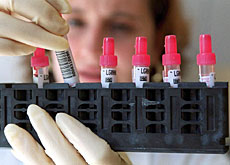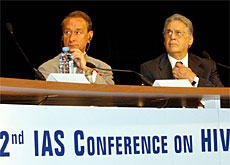Basel scientists tackle Aids-related illnesses

Scientists in Basel are organising trials of a new approach to prevent fatal Aids-related illnesses.
They are building on Australian research on rejuvenating the immune system, which has already shown encouraging results with cancer patients.
Scientists believe that if they can turn the immune systems of HIV/Aids patients back on, they will initially be able to stabilise their condition and eventually eradicate the virus from their bodies.
A major problem confronting HIV/Aids patients is the recovery of specialised white blood cells, called T cells, which are destroyed by the HIV infection.
These immune cells are not only needed to control the virus but also to prevent other severe, often fatal, infections.
The problem is that the thymus, the organ which exclusively produces the T cells, “switches off” at puberty. HIV/Aids patients therefore have no means of restoring their immune defences.
“A considerable percentage of patients show no increase of these important immune cells,” said Manuel Battegay, who heads the division of infectious diseases at Basel University Hospital, where the trials will be centred.
“We currently have good anti-HIV drugs that act on the virus itself but we urgently need agents that specifically boost the immune system,” said Sharon Lewin, director of infectious diseases at the Alfred Hospital in Melbourne.
Immune response
Researchers in Australia have shown that an existing class of drugs can regenerate the thymus, and thereby replace lost T cells or prompt existing T cells to function better.
Patients with prostate cancer and patients undergoing bone marrow transplantation have shown some encouraging results.
“If this therapy can be translated to HIV/Aids patients it promises to overcome one of the most important hurdles in HIV therapy,” Battegay told swissinfo.
It is planned that up to 50 patients will undergo treatment in Europe with a similar study taking place in Australia.
“Together with Australian colleagues, we are conceiving a pilot trial in patients who show low numbers of these immune cells and we hope that we can stimulate the immune system so that immune responses are better,” said Battegay.
Scepticism
However, not everyone is convinced that this approach will work.
“What remains critical to block the disease is really the suppression of viral replication,” said immunologist, Guiseppe Pantaleo, from Lausanne University Hospital.
The Australian approach has been developed by the Melbourne-based biotechnology business development company, Norwood Abbey, together with its partner Monash University.
swissinfo, Vincent Landon
The thymus is a small organ located in the chest between the base of the throat and the front of the heart.
It reaches its maximum weight during puberty then slowly decreases in size during adulthood and is gradually replaced by fat tissue.
Until puberty, the thymus is involved in the production of a type of white blood cell important in the immune system.
These T-lymphocytes develop in the thymus and then travel to lymph nodes throughout the body.
There they help the immune system protect the body from viruses, fungus and other types of infections.
A major conference on Aids is taking place in Paris 20 years after the link between HIV and Aids was discovered.
It is organised by the International Aids Society and the French National Agency for Research on Aids (ANRS).
The aim is to share the latest advances in HIV research.
Some 6,000 delegates from 120 countries are attending.

In compliance with the JTI standards
More: SWI swissinfo.ch certified by the Journalism Trust Initiative




You can find an overview of ongoing debates with our journalists here. Please join us!
If you want to start a conversation about a topic raised in this article or want to report factual errors, email us at english@swissinfo.ch.